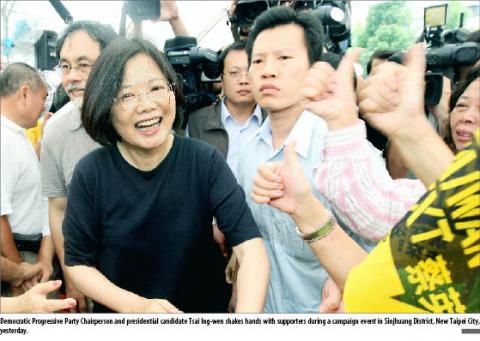Democratic Progressive Party (DPP) Chairperson Tsai Ing-wen (蔡英文) yesterday said she would continue to “listen carefully” to dissenting opinions over the party’s list of -legislator-at-large candidates released last month, but maintained that the nominations were final.
Some have complained that the list, which was approved by a party committee on June 30, does not include enough civic representatives and has too many career politicians, including three of her former spokespersons.
Earlier in the day, the Taiwan Democracy Watch, an umbrella -organization of civic groups, said it was “surprised” by the DPP nominations and that the party had missed an opportunity to include several civic figures that would have broadened its base.

Photo: CNA
Despite refusing to discuss individual names, the organization is believed to have been referring to people such as DPP Legislator Huang Sue-ying (黃淑英), a women’s equality advocate, who was not included in the top 16 places — considered the “safe list” — of the DPP at-large roster, making her re-election unlikely.
Party officials have pointed to the lack of guaranteed spots — the DPP elected 14 out of 34 nominated legislators-at-large in 2008, but is looking to gain at least two more seats next year — as the reason why several influential politicians and highly ranked lawmakers were also left off the safe list.
Huang, a two-term at-large legislator, was given top marks last month by the non-partisan Citizen Congress Watch, a legislative watchdog, for her work on the legislature’s Social Welfare and Environmental Hygiene Committee.
Speaking at a discussion organized by the Taiwan Democracy Watch, Academia Sinica researcher Wu Nai-teh (吳乃德) said that seasoned politicians on the roster should have run in local elections, leaving the at-large seats for activists and civic representatives who might not otherwise have a chance to be elected.
“Nominating civic figures as -legislators-at-large is a symbolic move and provides different avenues for a party to develop itself,” said Wu, a sociology research fellow. “It is wrong to believe that these people, just because they represent the disadvantaged, will not make good politicians.”
While the safe list does include civic figures such as Legislator Chen Chieh-ju (陳節如), an advocate for the disabled who was listed as No. 1 for the second time, critics said that most other spots on the safe list went to long-time politicians such as Chen Chi-mai (陳其邁), a DPP spokesperson; Lee Ying-yuan (李應元), a former party deputy secretary-general; former lawmaker and close aide of former premier Su Tseng-chang (蘇貞昌) Wu Ping-jui (吳秉叡); DPP caucus whip Ker Chien-ming (柯建銘) and former lawmaker Tuan Yi-kang (段宜康).

DAREDEVIL: Honnold said it had always been a dream of his to climb Taipei 101, while a Netflix producer said the skyscraper was ‘a real icon of this country’ US climber Alex Honnold yesterday took on Taiwan’s tallest building, becoming the first person to scale Taipei 101 without a rope, harness or safety net. Hundreds of spectators gathered at the base of the 101-story skyscraper to watch Honnold, 40, embark on his daredevil feat, which was also broadcast live on Netflix. Dressed in a red T-shirt and yellow custom-made climbing shoes, Honnold swiftly moved up the southeast face of the glass and steel building. At one point, he stepped onto a platform midway up to wave down at fans and onlookers who were taking photos. People watching from inside

A Vietnamese migrant worker yesterday won NT$12 million (US$379,627) on a Lunar New Year scratch card in Kaohsiung as part of Taiwan Lottery Co’s (台灣彩券) “NT$12 Million Grand Fortune” (1200萬大吉利) game. The man was the first top-prize winner of the new game launched on Jan. 6 to mark the Lunar New Year. Three Vietnamese migrant workers visited a Taiwan Lottery shop on Xinyue Street in Kaohsiung’s Gangshan District (崗山), a store representative said. The player bought multiple tickets and, after winning nothing, held the final lottery ticket in one hand and rubbed the store’s statue of the Maitreya Buddha’s belly with the other,

‘COMMITTED TO DETERRENCE’: Washington would stand by its allies, but it can only help as much as countries help themselves, Raymond Greene said The US is committed to deterrence in the first island chain, but it should not bear the burden alone, as “freedom is not free,” American Institute in Taiwan Director Raymond Greene said in a speech at the Institute for National Defense and Security Research’s “Strengthening Resilience: Defense as the Engine of Development” seminar in Taipei yesterday. In the speech, titled “Investing Together and a Secure and Prosperous Future,” Greene highlighted the contributions of US President Donald Trump’s administration to Taiwan’s defense efforts, including the establishment of supply chains for drones and autonomous systems, offers of security assistance and the expansion of

STREAMLINED: The dedicated funding would allow the US to transfer equipment to Taiwan when needed and order upgraded replacements for stockpiles, a source said The US House of Representatives on Thursday passed a defense appropriations bill totaling US$838.7 billion, of which US$1 billion is to be allocated to reinforcing security cooperation with Taiwan and US$150 million to replace defense articles provided to the nation. These are part of the Consolidated Appropriation Act, which the US House yesterday passed with 341 votes in favor and 88 against. The act must be passed by the US Senate before Friday next week to avoid another government shutdown. The US House Committee on Appropriations on Monday unveiled the act, saying that it allocates US$1 billion for the Taiwan Security Cooperation Initiative